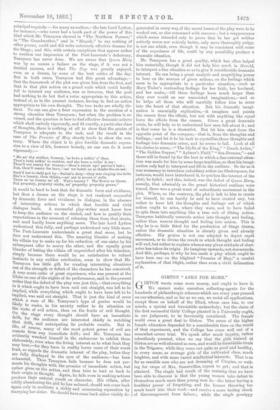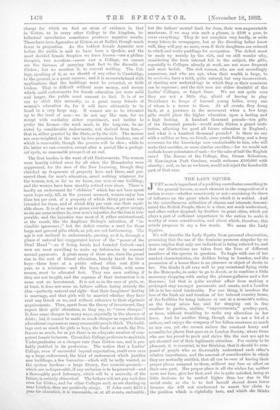GIRTON "ASKS FOR MORE." G IRTON wants some more money, and
ought to have it. We cannot make ourselves collecting-agents for the hundreds of philanthropic schemes which are every year pressed on our attention, and so far as we can, we resist all applications, except those on behalf of the Blind, whose case has, to our minds, a special and irresistible melancholy; but the claim of the first successful Girls' College planted in a University ought, in our judgment, to be favourably considered. The female world owes a great deal to Girton. The cause of the higher female education depended for a considerable time on the result of that experiment, and the College has come well out of a somewhat severe trial. We speak after much inquiry, rather relentlessly pursued, when we say that the girls trained at Girton are as well educated as men, and would be formidable rivals in the Triposes ; while they come out quite as good and healthy, in every sense, as average girls of the cultivated class, much brighter, and with more varied intellectual interests. That is as far as sensible men who are not dreaming of Utopias, or wait- ing for crops of Mrs. Somervilles, expect to get; and that is attained. The single bad result of the training that we have been able to discover is that the young women take defeat to themselves much more than young men do—the latter having a healthier power of forgetting, and the former throwing too much heart into their work—and receive a more lasting shock of discouragement from failure ; while the single gossippy
charge for which we find an atom of evidence is, that in Girton, as in every other College in the kingdom, in- tellectual speculation sometimes produces negative results. There have been Agnostics at Girton, as at Balliol, though much fewer in proportion. As the boldest female Agnostic now before the public is said to have been a Quaker, and the most decided female Sceptics we have known—one a philan- thropist, two novelists—never saw a College, we cannot see the fairness of carrying that fact to the discredit of Girton ; but we mention it, to conceal nothing. The Col- lege, speaking of it, as we should of any other in Cambridge, in the general, is a great success ; and it is so overwhelmed with applications that the buildings must be extended, or faith broken. That is difficult without more money, and money which, until endowments for female education are more solid and larger, the public must consent to find. It is of no use to shirk this necessity, as a great many friends of women's education do, for it will have ultimately to be faced in a very large way. If women are to be educated up to the level of men—we do not say like men, for we accept with cordiality either experiment, and incline to prefer the former—the work must, in the long-run, be as- sisted by considerable endowments, not derived from fees,— that is, either granted by the State, or by the rich. The women are over-weighted in the race by two pecuniary burdens, one of which is removable, though the process will be slow ; while to the latter we can conceive, except after a peried like a geologi- cal cycle, no reasonable prospect of an end.
The first burden is the want of old Endowments. The women were heavily robbed once for all when the Monasteries were suppressed, for the men of the New Learning, though they clutched up fragments of property here and there, and pre- served them for men's education, saved nothing whatever for the women, not, so far as we know, one acre or one building ; and the women have been steadily robbed ever since. There is hardly an endowment for " children " which has not been spent upon boys only, till, at the present moment, women enjoy less than ten per cent, of a property of which thirty per cent. was intended for them, and of which fifty per cent, was their equit- able share. It is of no use to groan over the loss, or grow savage, as we see some writers do, over men's injustice, for the loss is irre- parable, and the injustice was most of it either unintentional, or the result, like the Anglican Bishop's salvation, of " in- vincible ignorance ;" but the deficit creates a need for those large and general gifts which, as yet, are not forthcoming. The age is not inclined to endowments, passing, as it is, through a phase of natural but exaggerated horror of the "power of the Dead Hand "—as if living hands had founded Oxford—and men are most unwilling to make up deficiencies by unusual annual payments. A great many of them are, since the grand rise in the cost of liberal education, heavily taxed for their boys—three boys at a public school often cost 2500 a year, as a minimum—and the boys, they think, with some reason, must be educated first. They can earn nothing if they are not taught, and the expense of their instruction is in some sort an investment. It is not so in the case of girls, or, at least, it does not seem so, fathers seldom losing entirely the idea—perfectly natural and. right—that their daughters' destiny is marriage, and that girls will be married whether they have read any Greek or no, and without reference to their algebraic acquirements. Then, apart from the theory of investment, they expect their girls' education, as they say, to "come cheaper." It does come cheaper in many ways, especially in the absence of debts ; but it cannot be made so much cheaper as regards direct educational expenses as many reasonable people think. The build- ings cost as much for girls as boys, the books as much, the Pro- fessors as much, for as yet there is no adequate number of com- petent female lecturers. Cavendish College professes to maintain Undergraduates at a cheaper rate than Girton can, and is pro- bably justified in its profession. The notion that a Ladies' College, even if successful beyond expectation, could ever save up a large endowment, the kind of endowment which justifies new buildings, a few bursaries—which will be sadly wanted, as the system hardens—a large library, fine exercise-grounds- which are indispensable, if any seclusion is to be preserved—and a thoroughly good infirmary, which will be a necessity of the future, is entirely chimerical. The fathers will not pay such fees even for Girtoa, and for other Colleges such as are-starting up near London, they are positively stingy. if John costs 2250 a year for education, it is reasonable, or, at all events, endurable ; but the fathers' mental limit for Jean, their non-augmentable maximum, if we may coin such a phrase, is £100 a year, to cover everything. They do not complain very loudly, or write many letters to newspapers, but as the directing ladies know well, they will pay no more, even if their daughters are reduced to stitch and make puddings for occupation. The deficit must be made up mainly by the rich, a.ud we still wonder why, considering the keen interest felt in the subject, the gifts, especially to Colleges already at work, are net more frequent and more lavish. The rich women, who are not exceedingly numerous, and who are apt, when their wealth is large, to be arrierees, have a trick, quite natural, but very inconvenient, of starting new undertakings in which they or their nominees can be supreme ; and the rich men are either doubtful of the Ladies' Colleges, or forget them. We are not quite sure they are not a little shy, afraid of having to play Providence to heaps of learned young ladies, every one of whom is a terror to them. At all events, they /tang back, at a juncture in the movement when a few large gifts would place the higher education upon a lasting and a high footing. A hundred thousand pounds—ten gifts of ten thousand pounds—would make Girton a grand insti- tution, affecting for good all future education in England ; and what is a hundred thousand pounds P Is there no one with a million or two, no Greek, some poetic feeling, and a deep reverence for the knowledge now unattainable to him, who will make that sacrifice, or some similar sacrifice,—for we would not exclude lesser potentates of cash—for the sake of half the English race ? The Bursar of the College, Mrs. Croom Robertson, 31 Kensington Park Gardens, would welcome 2100,000 with alacrity ; and, so far as we know, would not reject the hundredth part of that sum.



































 Previous page
Previous page